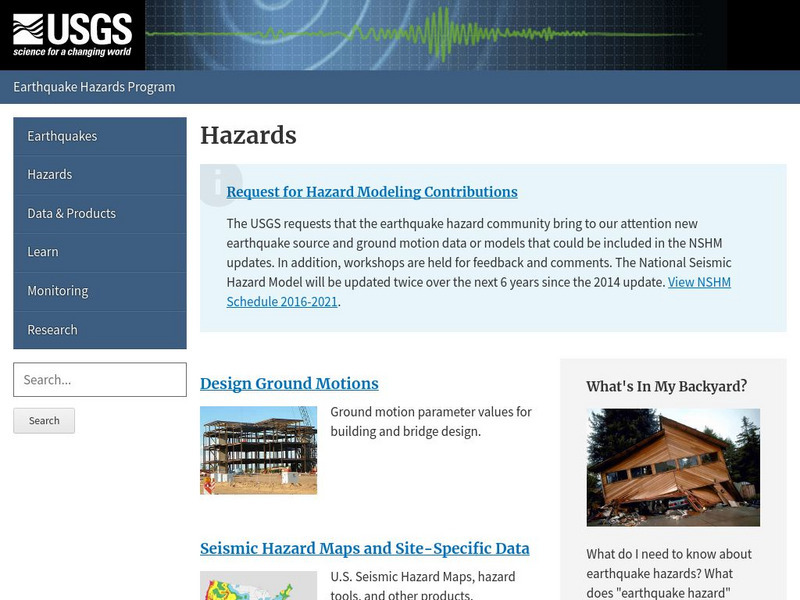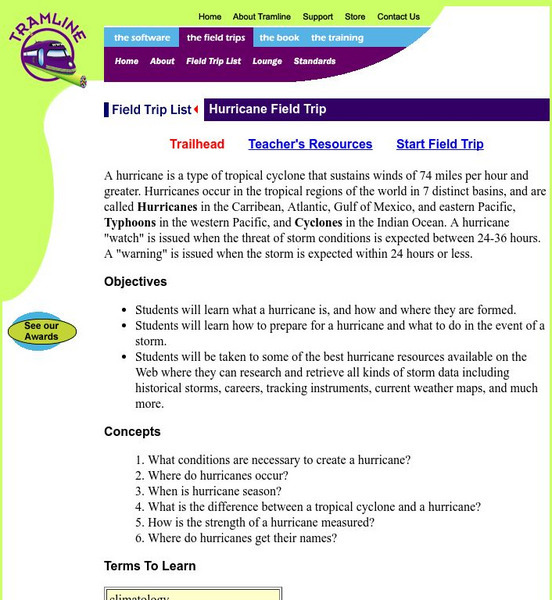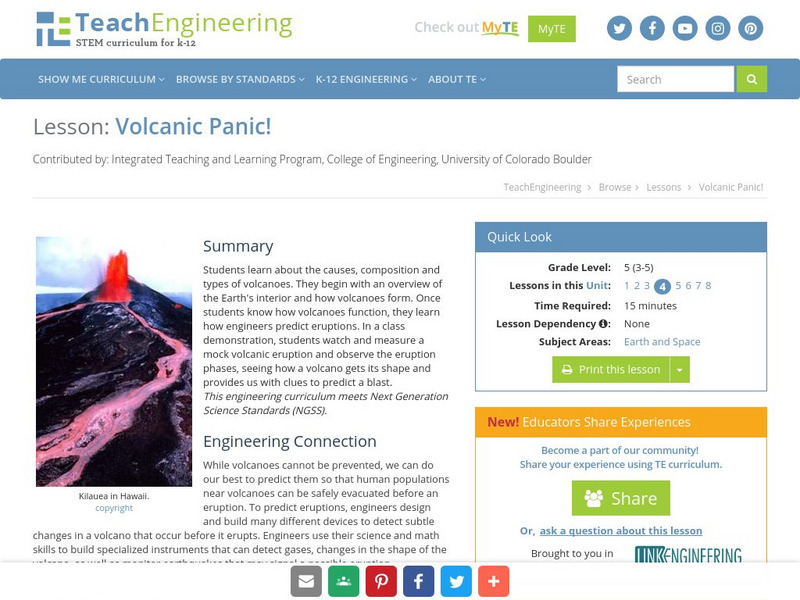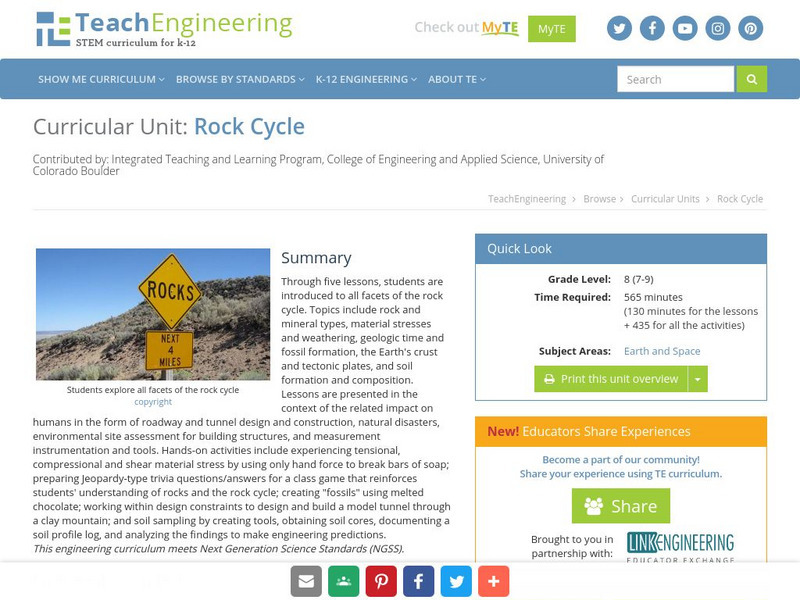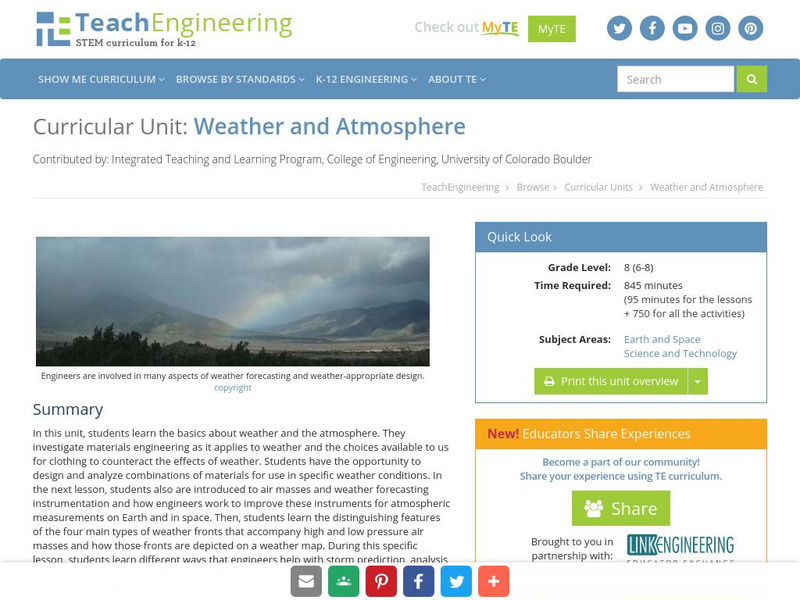Alabama Learning Exchange
Alex: Are You Prepared?
Natural disasters come in many different forms. In order to be better prepared, students have to know the different types of disasters. In this lesson students will research natural disasters in order to create a brochure highlighting an...
TeachEngineering
Teach Engineering: Rock Solid
Rocks cover the earth's surface, including what is below or near human-made structures. With rocks everywhere, breaking rocks can be hazardous and potentially disastrous to people. Learners are introduced to three types of material...
Geographypods
Geographypods: Hazards and Risk Management: Vulnerability
This learning module examines people's vulnerability to hazards and disasters. It looks at the reasons people live in hazard-prone areas, what factors affect their vulnerability, and what vulnerability looks like in different types of...
TeachEngineering
Teach Engineering: Making & Breaking: The Rock Cycle
Students learn the components of the rock cycle and how rocks can change over time under the influence of weathering, erosion, pressure and heat. They learn about geotechnical engineering and the role these engineers play in the...
eSchool Today
E School Today: Your Cool Facts and Tips on Earthquakes
Explains what earthquakes are, what causes them, the different types, tsunamis that can be caused by them, and how to prepare if living in an earthquake-prone area.
US Geological Survey
Us Geological Survey: Earthquake Hazards
Find out about earthquake hazards and damage. Some of the topics are an introduction to hazards, hazard maps, soil types and damage, and recent damage caused by earthquakes.
TeachEngineering
Teach Engineering: Pump It!
Pumps are used to get drinking water to our houses every day! And in disaster situations, pumps are essential to keep flood water out. In this hands-on activity, student groups design, build, test and improve devices to pump water as if...
Tramline
Hurricane Virtual Field Trip
What conditions are necessary to create a hurricane? Where do hurricanes occur? When is hurricane season? What is the difference between a tropical cyclone and a hurricane? How is the strength of a hurricane measured? Where do hurricanes...
TeachEngineering
Teach Engineering: Tsunami Attack!
Students learn about tsunamis, discovering what causes them and what makes them so dangerous. They learn that engineers design detection and warning equipment, as well as structures that that can survive the strong wave forces. In a...
TeachEngineering
Teach Engineering: Volcanic Panic!
Students learn about the causes, composition and types of volcanoes. They begin with an overview of the Earth's interior and how volcanoes form. Once students know about how a volcano functions, they learn how engineers predict...
University of Chicago
Ten Risky Places United States
Hazards of different types affecting areas of varying size are assessed in California, Seattle, Hawaii and elsewhere.
Weather Wiz Kids
Weather Wiz Kids: Volcanos
Great resource for learning all about tornadoes. Find out how they are formed, how they erupt, the different types, and notable volcanic eruptions. Also includes safety tips, animations, and activities.
TeachEngineering
Teach Engineering: Rock Cycle
Through five lessons, students are introduced to all facets of the rock cycle. Topics include rock and mineral types, material stresses and weathering, geologic time and fossil formation, the Earth's crust and tectonic plates, and soil...
TeachEngineering
Teach Engineering: Weather and Atmosphere
In this unit, students learn the basics about weather and the atmosphere. They investigate materials engineering as it applies to weather and the choices available to us for clothing to counteract the effects of weather. Students have...
Other
K 3 Learning Pages: Web Resources Thunderstorms
Check out this comprehensive list of web resources on thunderstorms and safety. Students and teachers will benefit from the links found on this site.
BBC
Bbc News: Science and Environment: How Earthquakes Happen
This site uses a series of animations to give an overview of earthquake types and their causes. This colorful site is accompanied by brief descriptions. Additional animations of other natural disasters are featured on the right side of...
eSchool Today
E School Today: Your Cool Facts and Tips on Droughts
Provides a definition of a drought while exploring types, causes and effects, economic, environmental, and social impact, and how to manage one.
Mocomi & Anibrain Digital Technologies
Mocomi: What Is a Drought?
Learn about droughts, their causes, different types, effects, and other interesting facts.
Mocomi & Anibrain Digital Technologies
Mocomi: What Is a Landslide and How Does It Happen?
Learn about landslides, their causes, the different types, how to prevent them, names of major landslides, and other interesting facts.







